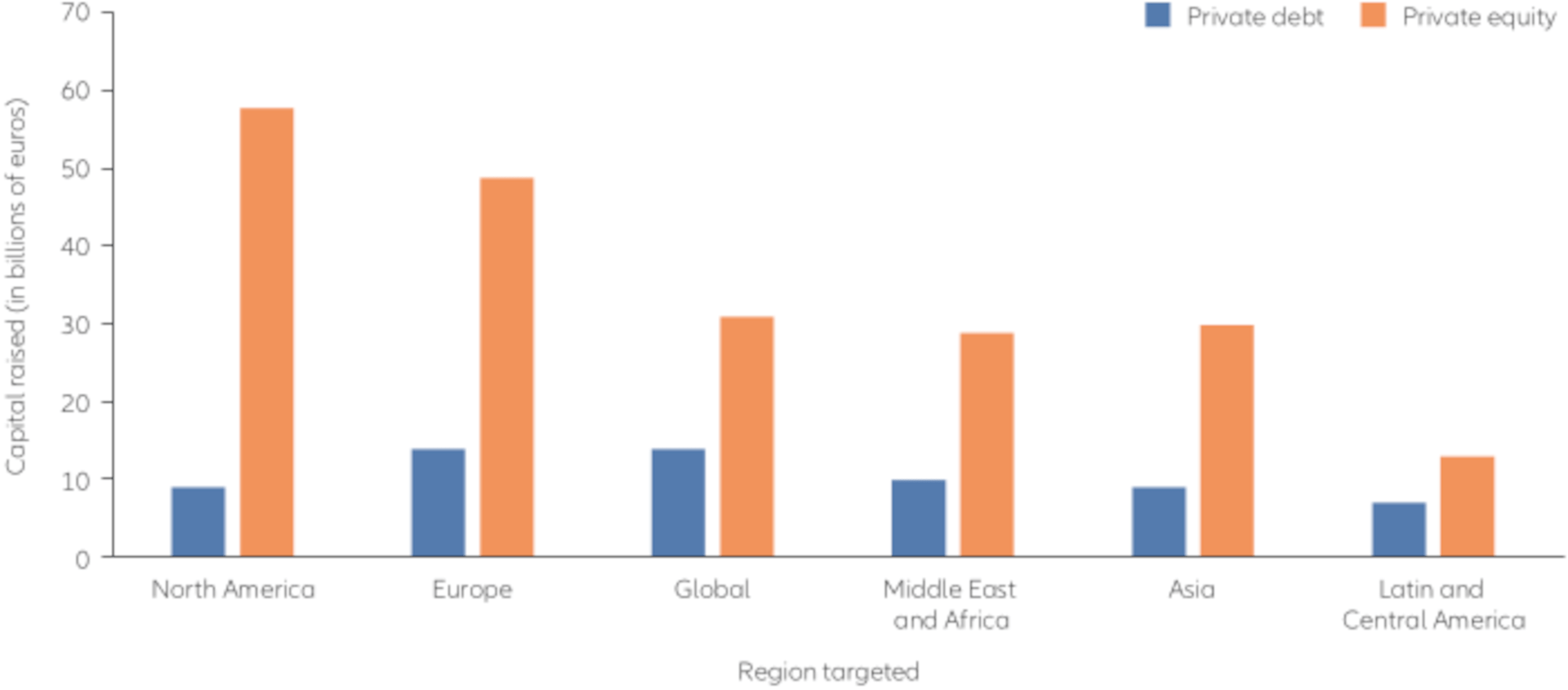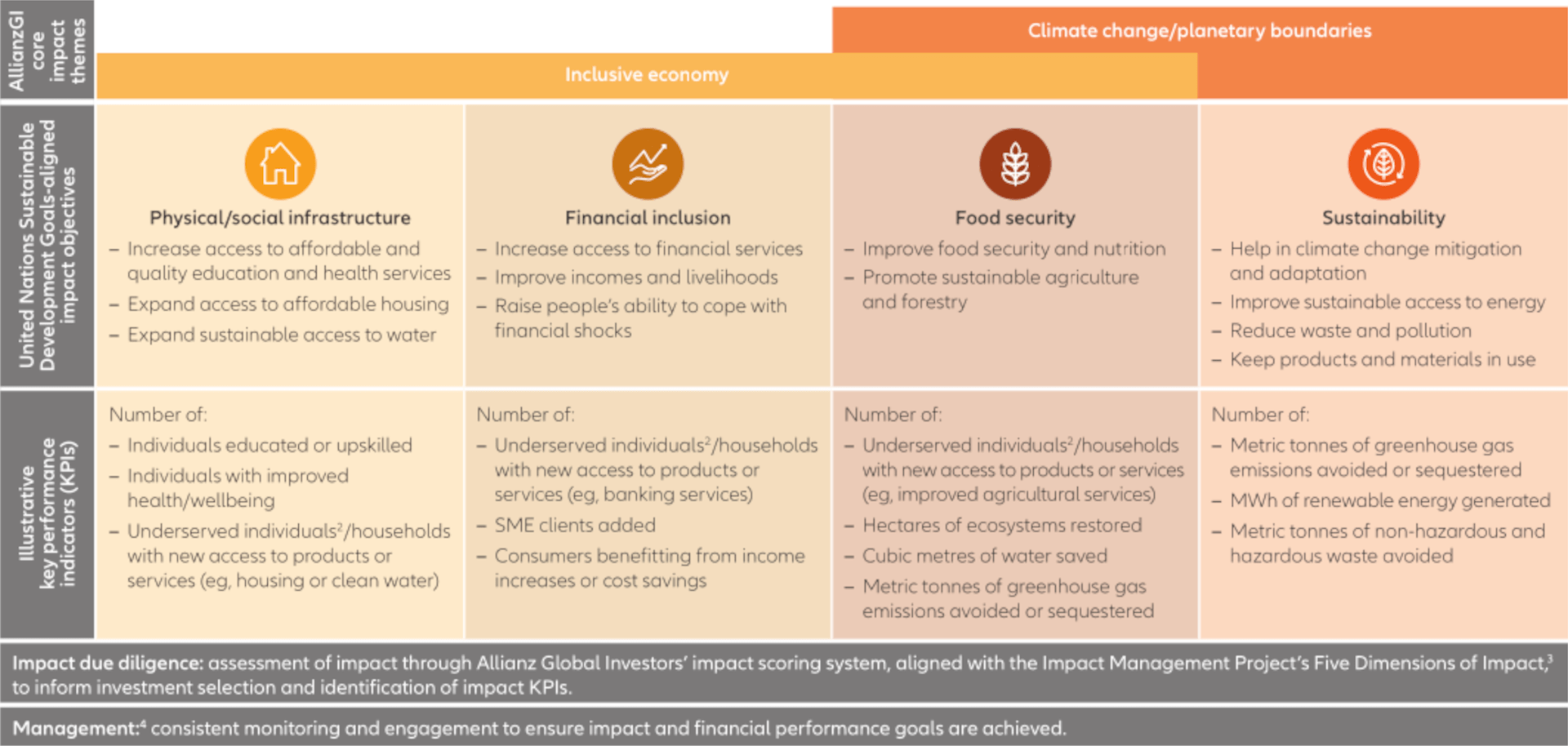Sustainability
Impact private credit: investing beyond the bottom line

Investors can help to address some of the global economy’s most pressing challenges through impact private credit, an emerging asset class focusing on a broader perspective of business value than profits to incorporate people and the planet.
Key takeaways
- Inequality, climate change and Covid-19 are some of the varied societal challenges focusing investor attention on finding ways to effect positive change.
- Impact investing goes beyond an environmental, social and governance approach by focusing investment only on companies generating lasting material positive change.
- Challenging the consensus view that impact investments are only possible via equity, interest is growing in impact credit as an innovative, targeted, and effective response to big global issues, including climate change.
- The financing is provided for firms delivering positive financial returns, as well as material and measurable environmental and/or social impact.
Climate change. Social inclusion. The Covid-19 pandemic. These pressing and varied global issues have highlighted various problems, from food and water security to inequality and healthcare and education access. And more investors want to use their capital to address these and many other societal and environmental challenges.
This focus is what’s driving the increased interest in impact investing. Traditionally, impact has been associated with specialised impact equity investing.1 More recently, interest has picked up in a lesser-known area of impact investing: impact credit (also known as impact debt).
Both prioritise providing funding to companies or projects focused on bringing measurable environmental or social benefits, as well as financial gains. With appropriate reward, impact private credit can finance initiatives traditional bank providers either overlook or decline.
An investment approach beyond ESG
Impact investing takes investors beyond an environmental, social and governance (ESG) approach. The latter – becoming an increasingly standard part of the investment process – measures companies’ performance against a range of metrics outside of financial factors that may still have a material impact on financial returns. Impact investing goes further by making financial returns only one factor in measuring a company’s performance. Fund managers channel investment only to those businesses or projects delivering positive and measurable change to society and the environment, as well as financial returns. And while ESG has gained most traction as a framework for change among listed companies, impact investing has the potential for a wider reach – to businesses outside public markets.
Impact private credit emerging as part of the solution
Impact investing has gained traction over the past two decades – galvanised by investor desire to respond to crises besetting the global economy and society.
Impact investing assets under management have reached USD 1.2 trillion.2 Private equity is often associated most closely with impact investing – and there’s been significant growth of impact private equity funds since the Covid-19 pandemic due to greater recognition of the challenges facing society highlighted by the outbreak. But private credit is also attracting more attention (see Exhibit 1). By working with asset managers that lend to companies or projects committed to realising value for the environment and society, as well as profits, investors can begin to shape an investment strategy in line with their values – and financial goals.
Structuring techniques such as blended finance3 are also starting to gain traction with asset owners to mobilise large-scale capital into impact projects in emerging markets or technologies.
Much of the asset class’s focus is on sectors with the greatest urgency to effect change – environmental sustainability, financial inclusion, healthcare, education, food security, and social infrastructure.
Exhibit 1: Impact funds raised via private debt (also called private credit) trail those raised via private equity

Source: Phenix Capital 2023 Impact Fund Universe Report.Note: data does not include Oceania. Data as at 31 January 2023
From humble beginnings: the evolution of impact private credit
From a desire by eighteenth-century Methodists and Quakers to invest in line with their beliefs to a push by Civil Rights era activists to screen out sectors or companies deemed unethical – impact investment can trace its roots back to socially-responsible investing movements of the past.
Equally, private credit has also emerged from a niche partly focused on distressed debt to a more mainstream product after the global financial crisis that is today used for financing everything from agriculture to renewable energy. Private debt, as defined by the Global Impact Investing Network, involves placing bonds or loans with a select group of investors, rather than being syndicated broadly. Impact private credit combines both trends in a financing tool that is not publicly tradeable.
And demand is growing. Private debt impact funds are looking to raise EUR 32 billion, more than the combined total of public debt and public equity impact funds, according to a May 2022 report by Phenix Capital.4
Borrowers helping the under-banked and under-privileged
Impact private credit can help a range of different companies and projects across developed and emerging markets. For example, companies providing low-carbon services to different industries, or infrastructure projects in underprivileged communities. Other potential borrowers might be microfinance institutions lending to small businesses and segments of society that rely on alternative financial services to banks.
In some cases, they might be unable to get adequate funding from other sources. That might be because they’re an early-stage business looking for growth capital or because banks and other traditional finance providers generally stick to lending to companies focused on more traditional business segments.
But borrowers can also include companies seeking to raise credit for the first time to fund specific impact-related goals.
Impact private credit can also take the form of rescue credit for companies with solid fundamentals but struggling through liquidity issues due to tough market conditions.
Demand for rescue credit may be particularly strong among small and high-growth impactful businesses, both in developed and emerging markets. Such firms may need help accessing credit financing under current market conditions as investors tend to shift their allocations to more traditional asset classes. Impact private credit can make a difference.
Exhibit 2: For companies operating in certain sectors, lenders can set key performance indicator to measure the impact of their funding

1. KPIs in alignment with Global Impact Investing Network’s IRIS+ system, the widely accepted system for managing, measuring and optimising impact.
2. Depending on the context, underserved clients may include low-income demographics, minority populations with specific needs that are underserved, or other groups.
3. The Five Dimensions of Impact are who, what, how much, contribution and risk.
4. Impact management framework leverages on the Operating Principles for Impact Management, a framework to ensure that impact considerations are integrated within investments.
Incentives to effect and align change
Requiring borrowers to provide regular financial reporting and comply with certain financial tests (ie, financial covenants) is one of the common ways lenders monitor and influence the financial performance of borrowers. Lenders can take a similar approach when providing funding for environmental or social issues. This means incorporating impact reporting requirements and impact covenants into credit documents to safeguard the use of funding and to incentivise the acceleration of impact generation. An example of this might be working with company management to develop specific impact key performance indicators (KPIs) and targets, like the number of individuals upskilled or carbon emissions reduced by the company’s customers (see Exhibit 2).
Another tool to incentivise progress on sustainability issues are ESG-linked margin ratchets, which reduce the loan interest margin as the borrowing company’s performance improves against defined metrics ranging from carbon intensity levels to eradication of gender pay gaps.
Private credit as a potential alternative
Private credit offers several strengths over both private equity and public debt – for both the investor and the company receiving the funding:
For the investor:
- Help in achieving impact and financial goals. The former might include lending to small, robust businesses or companies in more challenging jurisdictions that would otherwise be excluded from public capital markets or supporting sustainable social and climate-friendly initiatives.
- The chance to increase investments in businesses as they grow, benefiting from potential upside.
- Diversification benefits: given their illiquid nature, private credit investments tend to have a lower correlation with public capital markets and lower return volatility in turbulent markets.
- Higher recovery rates than public markets during downturns,5 while fewer lenders help ease the complexity of debt restructuring.
For the company:
- Credit solutions tailored to the needs of the company and an investment approach adaptable through the stages of a company’s growth.
- No dilution of shareholdings and no handover of control of the business, a potentially attractive option, particularly for founder-led firms.
- Flexibility in funding structures relative to public markets, enabling funding to be tailored to suit the short- to medium-term goals of the business and helping to enhance returns for shareholders.
Targeting the right approach
To maximise the possibility for positive change, investors need a robust impact methodology to ensure impact as well as returns are achieved. Allianz Global Investors’ impact framework integrates impact across the lifecycle of an investment via a four-step approach:6
- Establishing impact objectives: to ensure that the investment strategy targets key societal challenges in line with the United Nations Sustainable Development Goals (UN SDGs).7
- Assessing impact materiality and additionality:applying our impact scoring system to inform our investment selection and decision-making.
- Identifying key performance indicators: to measure and report against to demonstrate impact delivery, as well as to communicate our active engagementa with investees in ways that generate greater impact where possible.
- Continuously testing, learning and market-building:to strengthen our approach and impact generation.
Unlike traditional bank lending, investors have a broader responsibility beyond their financial contribution. They must actively engage with the borrower to help ensure impact is being generated on their environmental and social goals.
As more investors look to invest beyond the bottom line, impact private credit is likely to emerge as an increasingly integral tool to effecting positive environmental and social change.
1 While impact investment has mainly been in private markets, some asset managers are also increasingly exploring it in listed equity markets, according to Global Impact Investing Network. Source: Impact Investing in Listed Equities, Global Impact Investing Network, June 2021.
2 Source:GIINsight: Sizing the Impact Investing Market 2022, Global Impact Investing Network, October 2022.
3 Blended finance combines private and public capital to fund large scalable structures.
4 Source: Impact Report on Private Debt, May 2022, Phenix Capital.
5 Understanding Private Credit, Goldman Sachs Asset Management, 20 October 2022 Understanding Private Credit
6 For further detail, see: "Managing and measuring impact in private markets" by AllianzGI's Diane Mak.
7 United Nations Sustainable Development Goals are seventeen interlinked objectives designed to serve as a shared blueprint for peace and prosperity for people and the planet.








